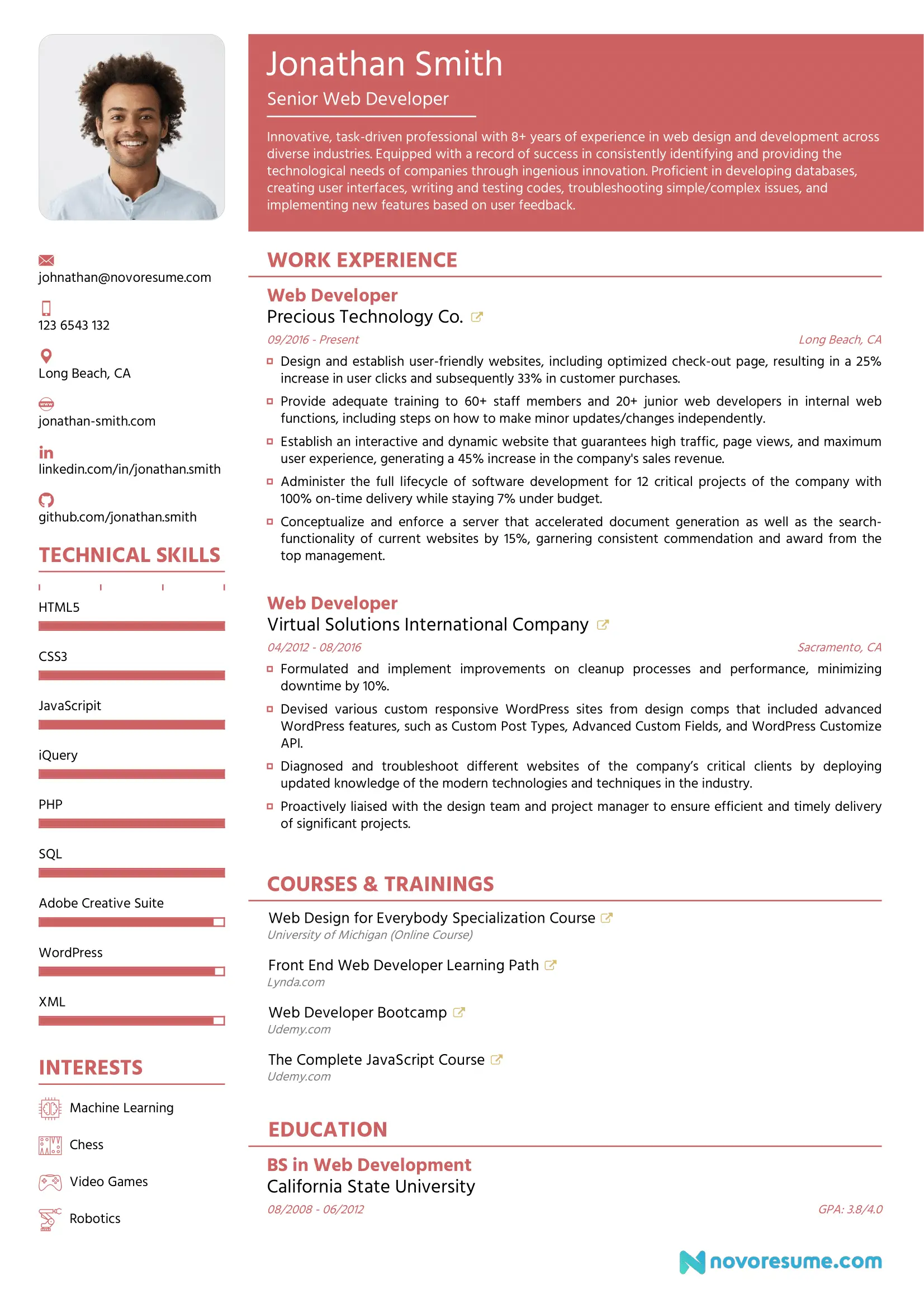Becoming a freelance web developer is an exciting and rewarding career choice.
In today’s digital age, the demand for web development skills is skyrocketing, offering numerous opportunities for those with the right expertise.
Whether you’re just starting or looking to transition into freelancing, this ultimate guide will provide you with a step-by-step roadmap to becoming a successful freelance web developer.
It is a complete 12 Steps blueprint with value-packed information.
From developing essential skills to finding clients and managing your business, we will cover everything you need to know to thrive in this dynamic field.
Without further ado, let’s get started.
STEPS TO BECOME A FREELANCE WEB DEVELOPER
#STEP 1: Developing the Skills
Before embarking on your freelance web development journey, it’s crucial to develop a strong foundation of skills.
This section will guide you through the essential steps to become proficient in web development.
a.) Understanding the basics of web development
To begin, it’s important to understand the core technologies of web development: HTML, CSS, and JavaScript.
- HTML (HyperText Markup Language) forms the structure and content of web pages.
- CSS (Cascading Style Sheets) handles the design and layout of web pages.
- JavaScript adds interactivity and dynamic functionality to web pages.
As a beginner, here’s an in-depth walkthrough to help you grasp these technologies:
– Online Learning Resources: Start your journey by exploring online tutorials and courses specifically designed for beginners.
Platforms like Codecademy, MDN Web Docs, and freeCodeCamp offer comprehensive and interactive lessons on HTML, CSS, and JavaScript.
– Hands-on Practice: Apply what you learn by creating simple web pages using a text editor.
Experiment with HTML tags to structure your content, apply CSS styles for visual appeal and use JavaScript to add interactivity.
– Delving Deeper: Familiarize yourself with more advanced concepts as you progress.
Learn about semantic HTML, which adds meaning to your markup, and understand responsive design principles to ensure your websites adapt to different devices.
b.) Specializing in a specific web development stack
Once you have a grasp of the basics, consider specializing in a specific web development stack.
This allows you to focus your efforts and become proficient in a particular area of expertise.
The main areas of specialization are front-end development, back-end development, and full-stack development.
Front-end Development
Front-end development focuses on creating the user interface and user experience of a website.
To specialize in front-end development, follow these steps:
i. Master the Fundamentals: Solidify your knowledge of HTML, CSS, and JavaScript.
Understand how to structure content, style elements, and add interactivity.
ii. Explore Front-end Frameworks: Dive into popular front-end frameworks like React, Angular, and Vue.js.
These frontend frameworks provide efficient ways to build complex user interfaces and manage state.
iii. Responsive Design: Learn how to create responsive layouts that adapt to different screen sizes.
Use media queries and flexible design techniques to optimize the user experience across devices.
Website Hurdles Learning Guide:
– 13 Best Youtube Channels for Learning HTML and CSS
– 9 Best Youtube Channels for Learning JavaScript
– 9 Best JavaScript Books for Beginners, Intermediate and Advance Programmers
– 13 Best Websites to Sharpen Your Frontend Development Skills
– 13 Proven Ways to Improve Your Frontend Development Skills
Back-end Development
Back-end development involves working on server-side logic and database management.
To specialize in back-end development, follow these steps:
i. Choose a Programming Language:
Select a programming language commonly used for back-end development, such as JavaScript (Node.js), Python (Django, Flask), or Ruby (Ruby on Rails) or PHP.
Learn the syntax, features, and best practices of your chosen language.
ii. Learn Back-end Frameworks:
Familiarize yourself with popular back-end frameworks that align with your chosen programming language.
These frameworks provide tools and patterns to streamline back-end development.
Examples include Node.js frameworks like Express.js, Django for Python, Ruby on Rails for Ruby, Laravel for PHP.
iii. Work with databases:
Learn how to interact with databases to store and retrieve data.
Common databases used in web development include MySQL, PostgreSQL, MongoDB, and SQLite.
Understand how to write queries, design database schemas, and optimize database performance.
iv. API development:
Gain knowledge of designing and building APIs (Application Programming Interfaces) to allow communication between the front-end and back-end.
Learn about RESTful API principles, HTTP methods, authentication, and handling data transfer in JSON format.
Full-stack Development
Full-stack development combines both front-end and back-end skills, allowing you to work on all aspects of a web application.
To specialize as a full-stack developer, consider the following steps:
i. Master Front-end and Back-end Skills: Develop a strong foundation in HTML, CSS, JavaScript, and a back-end programming language. Gain proficiency in both front-end and back-end frameworks.
ii. Integrate Front-end and Back-end: Learn how to connect the front-end and back-end parts of a web application. Understand concepts like API integration and data flow between the client and server.
iii. Work on Full-stack Projects: Undertake projects that require you to build both the front-end and back-end components. This hands-on experience will strengthen your skills and understanding.
Remember, specialization takes time and continuous learning.
c.) Learning popular web development frameworks and tools
We’ve briefly talked about this earlier.
To become a freelance web developer, you need to expand your skills by mastering popular frameworks and tools used in the industry.
Here is a proper breakdown of web development frameworks and tools.
- Front-end frameworks: React, Angular, Vue.js
- Back-end frameworks: Node.js, Django, Ruby on Rails
- Version control systems: Git
- Code editors and IDEs: Visual Studio Code, Sublime Text
Website Hurdles Learning Guide:
– How to Choose a Technological Stack for Web Development
#Step 2: Gain Practical Experience By Working on Web Development Projects
Building practical experience is crucial to becoming a proficient freelance web developer.
You really don’t need to get hired first before you start building practical work experience.
In fact, clients only want to hire developers who have carried out realist development projects especially if the project is similar to what to want.
Here are 3 realistic ways to gain practical work experience as a web developer:
i.) Build Personal Projects
One of the best ways to practice and showcase your skills is by building personal projects.
Choose projects that align with your interests and allow you to explore different aspects of web development.
Start small and gradually take on more complex projects as you progress. This hands-on experience will strengthen your problem-solving abilities and give you a portfolio of work to showcase.
ii.) Contribute to Open-Source Projects
Contributing to open-source projects is an excellent way to collaborate with other developers and gain valuable experience.
Explore popular open-source projects related to web development and find areas where you can contribute.
Start with smaller tasks, such as fixing bugs or adding documentation, and gradually take on more significant contributions.
Contributing to open-source projects not only enhances your skills but also demonstrates your ability to work in a team and collaborate effectively.
iii.) Collaborate with Other Developers
Collaborating with other developers on projects provides an opportunity to learn from their expertise and improve your teamwork skills.
Consider joining developer communities, attending hackathons, or participating in group projects where you can work alongside others.
Collaborative projects help you understand the dynamics of real-world development and expose you to different perspectives and approaches.
Having valuable projects that you can showcase to clients will help increase your chances of getting hired as a freelance web developer and also gives you an upper edge on freelancing platforms.
#STEP 3: Develop a Strong Online Presence
To succeed as a freelance web developer, it’s important to develop a strong online presence by utilizing social media platforms and joining online communities/forums related to web development.
This is important as it helps you engage with like-minded individuals and expand your network.
Here are some strategies to help you leverage social media for this purpose:
a.) Choose the right platforms:
Identify the social media platforms that align with your target audience and industry. Popular options for professional networking and showcasing work include LinkedIn, Twitter, and GitHub.
For a more visual approach, platforms like Instagram and Dribbble can be effective for sharing design-related content.
b.) Optimize your profiles:
Create professional profiles on each selected platform, ensuring consistency in branding and messaging.
Use a clear and recognizable profile picture, write a compelling bio that highlights your expertise, and include links to your portfolio website or relevant projects.
c.) Engage with the community:
Engage with fellow developers, potential clients, and industry influencers by commenting on their posts, sharing valuable insights, and participating in relevant discussions.
This can help you establish credibility and build relationships with potential clients or collaborators.
Personal take:
I find Twitter to be a very exciting platform to meet and connect with like minds.
I encourage you to attend web development-related spaces, but don’t just stop there, also connect with other attendees and the speakers/moderators.
The same applies to Linkedin. If you’re not yet on the platform then get onboard.
It may seem too professional for beginners but you’ll get used to it over time.
Connect with professionals in your niche, learn from their tips and advice and stay updated with standard requirements to be a seasoned global freelance web developer.
These connections are invaluable to your growth and can be helpful when you least expect them.

#STEP 4: Craft an Impressive Portfolio
A good portfolio showcases your skills, experience, and creativity, allowing potential clients to evaluate your work and determine if you’re the right fit for their projects.
Here are the key aspects to consider when building a freelance web developer’s portfolio:
– Showcase your best work:
Feature impressive and diverse projects that highlight your skills and experience.
– Provide project details:
Clearly explain each project’s overview, your role, technologies used, and how you met client goals.
– Highlight skills and expertise:
Clearly state your core competencies and specialized technologies.
– Demonstrate responsive design:
Showcase websites that adapt well to various devices and screen sizes.
– Include client testimonials:
Incorporate positive reviews and feedback from satisfied clients.
– Maintain a visually appealing portfolio:
Design a clean and visually attractive layout that reflects your personal brand and creativity.
– Provide contact information and a call to action:
Make it easy for potential clients to reach out to you and include a clear call-to-action on your portfolio website.
Some Examples of Quality Web Developers Portfolio
I scorched the internet to find some quality web developer’s portfolio to give your creation process and I’ll share my findings here with you.
Here are 12 web developers’ portfolio to inspire you:
- Adham Dannaway’s Portfolio
- Cassie Developers Portfolio
- Jesse Zhou’s Developers Portfolio
- Bruno Simon Portfolio
- Jason Lengstorf’s Portfolio
- Dan Spartling’s Portfolio
- Annie Bombanie’s Portfolio
- Robb Owen’s Portfolio
- Michael Pumo’s Portfolio
- Braydon’s Developer Portfolio
- Anurag Hazra Developers Portfolio
- Jamima Abu’s Portfolio
Website Hurdles Learning Guides:
– How to Build a Web Developer Portfolio from Scratch
#Step 5: Create a Web Developer’s Resume
Creating a well-crafted resume can be beneficial for a freelance web developer, even though freelancers may have a different approach to showcasing their skills compared to traditional employment.
Here’s what a good web developer’s resume entails, and whether it’s required for freelance web development:
– Contact Information:
Include your full name, professional email address, phone number, and links to relevant online profiles (such as LinkedIn or GitHub).
– Summary or Objective Statement:
Provide a concise summary of your skills, experience, and expertise as a web developer.
Tailor it to highlight your strengths and what sets you apart from other developers.
– Skills:
Enumerate your technical skills, including programming languages, frameworks, content management systems (CMS), databases, and any other relevant technologies.
– Experience:
Detail your professional experience, including freelance projects, contract work, or relevant full-time employment.
Focus on describing the scope of projects, your responsibilities, and notable achievements or contributions.
– Projects and Portfolio:
Highlight key projects you’ve worked on as a freelance web developer. Provide brief descriptions, technologies used, and outcomes achieved.
Consider including links to your online portfolio or GitHub repository to allow potential clients to review your work in more detail.
– Education and Certifications:
Include your educational background, relevant degrees or certifications, and any additional training or workshops related to web development.
– Freelance Experience:
Emphasize your freelance experience, including client management, project scope, deadlines, and successful delivery.
Highlight your ability to work independently, manage multiple projects, and meet client expectations.
– Additional Sections:
Depending on your expertise and accomplishments, you may include additional sections such as open-source contributions, speaking engagements, or relevant memberships or affiliations.
While resumes are commonly used in traditional employment scenarios, they can still be valuable for freelance web developers.
Even though freelancers may rely more on their portfolios, resumes serve as a concise summary of your skills and experience.
They provide potential clients with a quick overview of your background and expertise before delving into the portfolio.
Having a professional resume showcases your professionalism and attention to detail, which can give you an edge over other freelance web developers.
It also serves as a handy document for networking events, partnerships, or potential collaborations where a portfolio might not be immediately accessible.
Web Developer Resume Sample
Here’s what a standard web developer’s resume looks like:

#Step 6: Find Freelance Web Development Jobs
Now that you have the skills and a strong foundation, it’s time to find freelance web development jobs.
To do this, you have to first register on freelancing platforms.
Here are five popular freelancing platforms for web developers:
Upwork:
Upwork is one of the largest freelancing platforms, offering a wide range of job opportunities for web developers.
It allows freelancers to create profiles, showcase their portfolios, and bid on projects posted by clients.
Freelancer:
Freelancer is another well-known platform that connects freelancers with clients worldwide. It offers various web development projects, including website design, development, and maintenance.
Freelancers can create profiles, compete in contests, and submit proposals to clients.
Toptal:
Toptal is a platform that focuses on connecting top-tier freelancers, including web developers, with high-quality clients. It has a rigorous screening process to ensure the quality of talent available on the platform.
Toptal offers opportunities for remote freelance work and provides support and resources to freelancers.
Guru:
Guru is a platform that offers a range of freelance jobs, including web development. It allows freelancers to create profiles, showcase their work, and bid on projects.
Guru provides various features, such as workrooms for collaboration and safe payment options.
Fiverr:
Fiverr is a platform that specializes in micro-jobs or gigs. Web developers can create profiles and offer specific services, such as WordPress customization, website optimization, or front-end development.
Clients can browse through freelancers’ profiles and hire them directly for their projects.
These platforms provide opportunities for web developers to find freelance work, connect with clients, and build their reputations in the industry.
Back then, Fiverr was the coolest kid on the block, it’s still a very popular freelancing platform but this is recent times and there are much more standard platforms like Upwork and Toptal.
Get started, the registration processes are simple and straightforward.
It’s important to thoroughly research and understand the terms, fees, and competition on each platform to determine which one aligns best with your goals and skills.
#Step 7: Nurturing Client Relationships
Once you secure freelance web development projects, it’s essential to nurture strong client relationships. Here’s how you can do it:
– Effective communication and client management
Clear communication is vital to understanding client expectations and delivering successful projects. Consider the following practices:
- Set clear expectations and goals from the beginning to ensure alignment.
- Practice active listening to fully understand the client’s requirements and objectives.
- Provide regular progress updates to keep clients informed and gather feedback along the way.
– Delivering high-quality work
Delivering high-quality work is crucial for client satisfaction and building a positive reputation. Keep the following in mind:
- Write clean and efficient code to ensure scalability and maintainability.
- Conduct thorough testing and debugging to ensure the website functions flawlessly.
- Follow best practices and industry standards to produce professional and reliable results.
– Building long-term relationships and client referrals
Fostering long-term relationships with clients can lead to recurring work and valuable referrals. Consider these strategies:
- Provide excellent customer service by being responsive, attentive, and accommodating.
- Offer ongoing maintenance and support services to keep clients satisfied and address any issues that arise.
- Ask satisfied clients for testimonials and referrals, which can boost your credibility and attract new clients.
#Step 8: Managing Finances and Legal Considerations
As a freelance web developer, managing finances and understanding legal considerations is vital. Here’s what you need to keep in mind:
– Setting freelance rates and pricing strategies
Determining the right pricing strategy is crucial for profitability. Consider the following factors:
- Determine whether to charge hourly rates or project-based fees, depending on the nature of the project.
- Consider your experience, expertise, and the complexity of the work when setting rates.
- Research market rates to ensure your prices are competitive.
– Creating contracts and agreements
Using contracts and agreements helps protect both you and your clients. Consider these essential elements:
- Define the project scope and deliverables clearly to avoid misunderstandings.
- Establish payment terms and milestones to ensure timely and fair compensation.
- Include clauses for revisions, termination, and intellectual property rights to protect your work.
– Managing taxes and finances
Proper financial management is vital for freelance success. Consider these practices:
- Keep track of your income and expenses to stay organized for tax purposes.
- Understand your tax obligations and deductions to ensure compliance.
- If you have the means, consult with an accountant or tax professional to ensure you meet all legal requirements.
#Step 9: Market Yourself Online
We earlier talked about “Creating a Strong Online Presence”.
But it doesn’t end there, you also have to market yourself online to let people know you offer freelance web development services.
In addition to the tips previously mentioned like:
- Leveraging social media platforms like LinkedIn and Twitter
- Optimizing your online profile and
- Building a portfolio site,
- Here are some extra key strategies to market yourself effectively online:
i.) Share your work:
Regularly share your web development projects, case studies, or code snippets to demonstrate your skills and expertise.
Use visually appealing images or videos to showcase your work and engage your audience. Provide context, explain your approach, and highlight the problem-solving aspects of your projects.
You can share your work on your social profiles and also on your website.
ii.) Create valuable content:
Share valuable content related to web development, such as tutorials, tips, or industry insights. This positions you as an authority in your field and encourages others to follow and engage with your content.
iii) Offer Free Resources or Consultations:
Provide value upfront by offering free resources, such as blog posts, tutorials, or templates. Consider offering free consultations to potential clients to understand their needs and demonstrate your expertise.
These gestures help establish credibility, build relationships, and can lead to paid project opportunities.
I’d like you to build up your confidence level to a point where you can directly reach out to potential clients or agencies directly through email or LinkedIn, showcase your portfolio and express your interest in collaborating.
Remember, effective online marketing requires consistency, persistence, and a genuine passion for your craft.
By implementing these strategies, you can successfully market yourself as a freelance web developer, attract clients, and build a thriving web development business.
#Step 10: Actively Seek Endorsements and Recommendations:
Request endorsements and recommendations from satisfied clients or colleagues you’ve worked with.
Make sure you add the endorsements and recommendations to the following platforms:
– Your Linkedin Profile
– Your Profile on Freelancing Platforms
– Your Portfolio site
Client Testimonials and Reviews:
Encourage satisfied clients to provide testimonials and reviews that highlight their positive experiences working with you.
Display these testimonials on your website and include them in your marketing materials.
Positive reviews build trust and serve as social proof of your abilities, attracting new clients to your freelance web development services.
#Step 11: Network and Build Connections
Networking plays a significant role in finding freelance projects. Consider the following networking opportunities:
- Attend industry events and conferences to meet potential clients and fellow web developers.
- Join local tech meetups and organizations to connect with professionals in your area.

#Step 12: Continuous Learning and Professional Growth
Web development is a field that evolves rapidly, so continuous learning is key to staying ahead. Here’s how you can foster professional growth:
– Staying updated with industry trends and technologies
Stay informed about the latest trends and technologies in web development. Consider these strategies:
- Read development blogs like ours; WebsiteHurdles.com and news websites to stay up to date with industry developments.
- Follow influential web developers and thought leaders on social media platforms.
- Engage in online courses and tutorials to learn new skills and stay current.
Website Hurdles Learning Guide:
– 7 Ways to Keep up with Web Development Trends
– Expanding your skillset
Diversifying your skillset can open up new opportunities. Consider these approaches:
- Learn closely related programming languages or frameworks to expand your capabilities.
- Obtain relevant certifications or degrees to demonstrate your expertise in specific areas.
BONUS: 8 Tips for Excelling on Freelancing Platforms
Here are my top 7 tips for excelling on freelancing platforms as a freelance Web Developer:
i. Build a Strong freelancing Profile:
Create a professional and comprehensive profile that highlights your skills, experience, and portfolio.
Clearly showcase your expertise, technologies you specialize in, and previous successful projects.
Use keywords relevant to web development to optimize your profile for search results.
ii. Showcase Your Portfolio:
Display a diverse and impressive portfolio that showcases your best work.
Include clear descriptions, screenshots, or links to live websites. Update your portfolio regularly to reflect your latest projects and demonstrate your skills across various domains.
iii. Bid Strategically:
Be selective in the projects you bid on and tailor your proposals to each client’s needs.
Take the time to understand their requirements and demonstrate how your skills and experience make you the best fit for the project.
Highlight your unique value proposition and provide examples of relevant past work.
iv. Communicate Effectively:
Clear and prompt communication is key to establishing trust and building successful client relationships.
Respond to inquiries and messages in a timely manner, be proactive in seeking clarifications, and maintain professionalism in all interactions.
Regularly update clients on project progress and deliverables.
v. Deliver Quality Work:
Strive to deliver high-quality work that exceeds client expectations. Pay attention to detail, follow instructions, and meet deadlines.
Test your work thoroughly to ensure it functions as intended across different browsers, devices, and screen sizes.
Providing a polished end product will help you earn positive reviews and repeat clients.
vi. Focus on Customer Service:
Offer exceptional customer service to your clients. Be attentive to their needs, actively listen, and provide solutions or suggestions when appropriate.
Offer post-project support, if agreed upon, to address any issues that may arise.
vii. Cultivate Positive Reviews and Ratings:
Encourage satisfied clients to leave reviews and ratings on the freelancing platform. Positive feedback and high ratings enhance your reputation and attract more clients.
Provide excellent service to increase the likelihood of receiving positive reviews and consider asking clients for feedback upon project completion.
viii: Be Professional and Reliable:
Maintain professionalism throughout your freelancing engagements. Be reliable, punctual, and transparent in your communication.
Honor your commitments, deliver on time, and be proactive in addressing any issues or challenges that may arise during the project.
And there you have it: The Complete 12 Steps Blueprint to Becoming a Freelance Web Developer.
Let’s take a look at some frequently asked questions around this topic.
FAQs
Q1: How long does it take to become a web developer?
The time it takes to become a web developer varies based on individual circumstances and dedication. However, with consistent learning, it can take 6 months to a year to acquire the necessary skills and gain experience.
Q2: How much do freelance web developers make?
The income of freelance web developers can vary based on factors such as skill level, experience, location, and the complexity of projects.
On average, freelance web developers can earn anywhere from $25 to $150 per hour, or more, depending on their expertise and the market they operate in.
Q3: Do I need a degree to become a web developer?
While a degree can be beneficial, it’s not always a requirement to become a web developer. Many employers and clients value practical skills and experience over formal education.
Building a strong portfolio and demonstrating your abilities through projects can be equally valuable.
Q4: What are the advantages of freelancing as a web developer?
Freelancing offers several advantages, including flexible working hours, the ability to choose projects that align with your interests, and the potential for higher earnings compared to traditional employment.
It also allows you to build a diverse portfolio and work with clients from around the world.
Q5: Can you freelance with just HTML and CSS?
Yes, you can freelance with just HTML and CSS. Many clients seek web developers who specialize in front-end development and can create visually appealing and responsive websites using HTML and CSS.
However, expanding your skill set to include JavaScript and other technologies can broaden your opportunities and allow you to take on more complex projects.
Q6: How do I stay updated with the latest web development technologies?
To stay updated, regularly engage in self-learning by reading industry blogs, following influential developers on social media, and participating in online courses or workshops.
Additionally, attending conferences and joining web development communities can provide valuable networking opportunities and keep you informed about the latest trends.
Q7: Can I earn money from HTML and CSS?
Absolutely! Yes, there are jobs out there that require only the knowledge of HTML and CSS. Some are entry-level jobs meaning they don’t pay as high as the core technical-oriented coding jobs.
Regardless, you can still earn a decent amount of money from the jobs.
See my article on 11 Jobs with Only HTML and CSS knowledge (earn up to $75k per year).
Q5: Can I start freelancing as a web developer with no prior experience?
While having prior experience can be advantageous, it’s not a strict requirement to start freelancing.
By building a strong foundation of skills, creating a portfolio of personal projects, and continuously learning, you can attract clients even as a beginner.
Start small, gain experience, and gradually expand your freelancing career.
Final Thoughts on How to Become a Freelance Web Developer
Becoming a freelance web developer requires a combination of technical skills, business acumen, and client management abilities.
By following the steps outlined in this ultimate guide, you can set yourself up for success in this dynamic and rewarding field.
Stanley’s Add-On
Hey Hurdles, I hope you enjoyed your read. If you find this content helpful then please share with your other developer friends and colleagues so we can all win together.
You can use the share icon as well to share with your social connections.
See My Other Helpful Learning Resources Here on Website Hurdles:
– 53+ Best Websites to Learn to Code for Free
– How to be a Web Developer: The Ultimate Guide








0 Comments